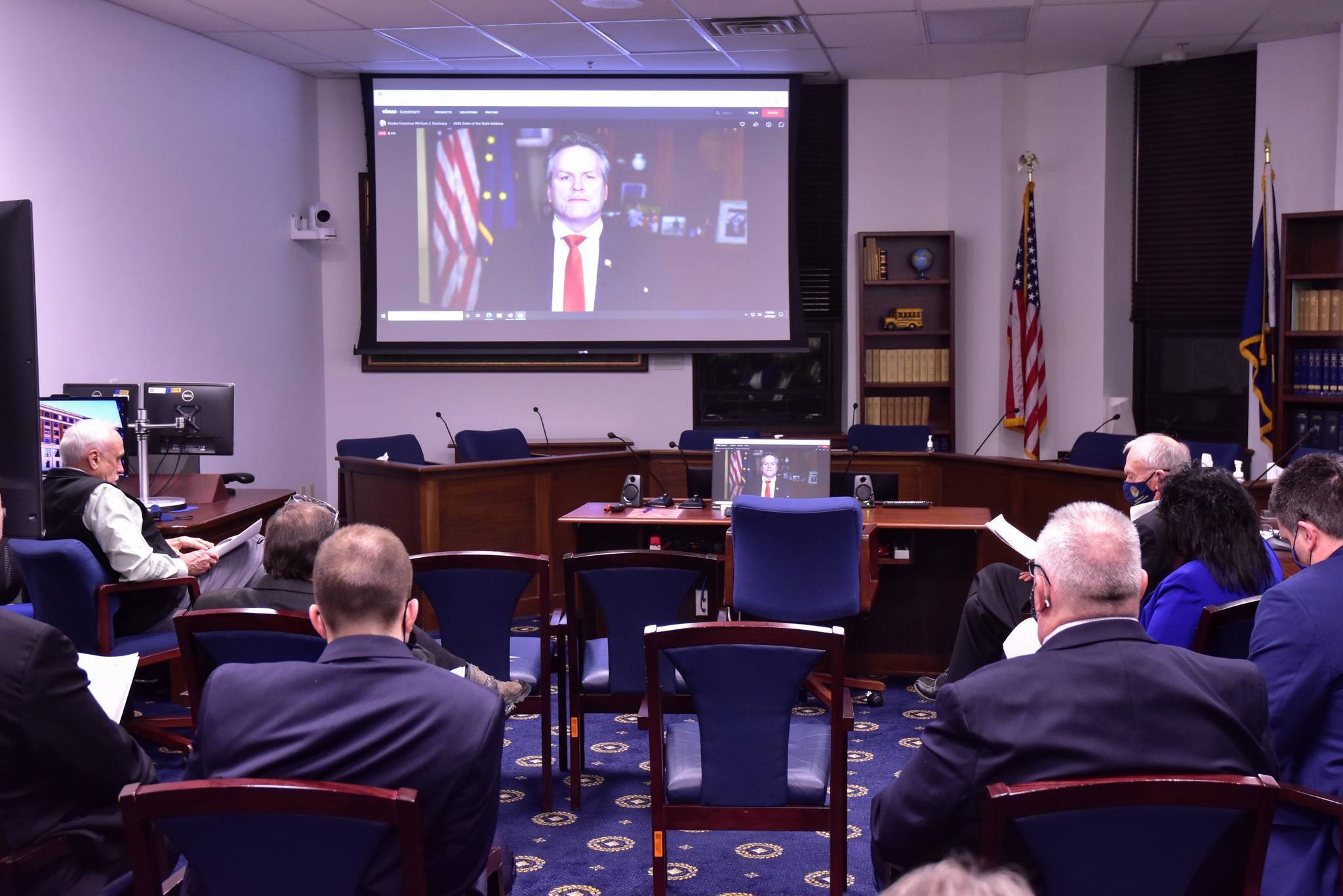Correction: An earlier version of this article incorrectly stated Senate President Peter Micciche supported the governor’s proposal for gaming. Micciche said he is interested and wants to hear more. The article has been updated to reflect the change. The Empire regrets the error.
The coronavirus pandemic demonstrated Alaska’s resilience, Gov. Mike Dunleavy said in his annual State of the State address, but it has also shown the state needs to be more independent.
Dunleavy gave the address in a live broadcast from Anchorage, the first time the speech hasn’t been given in person. Complications due to the pandemic and lack of organization in the House of Representatives led to governor to give address remotely.
Alaska needed to become more self-reliant, Dunleavy said. The pandemic has laid bare the state’s dependency on the outside, he said, and pledged to make Alaska more self-sufficient. Canada’s border closures and early fears the Port of Seattle would shut down showed just how reliant the state is on other states, Dunleavy said.
[Watch: Gov. Mike Dunleavy delivers State of the State address]
“This demonstrated to me that we have to examine our own vulnerabilities and reevaluate our dependence upon others,” Dunleavy said. “As a result, I charged my administration with researching how Alaskans can become more self-reliant within the framework of federalism. Part of becoming a truly self-reliant sovereign starts with the basics: food, security, energy and medicine.”
His administration will seek to expand the state’s agriculture and mariculture sectors, Dunleavy said, and would cut regulations to make it easier for farmers to prosper.
The governor pushed back against federal regulation of Alaska’s lands, saying the state had a constitutional obligation to develop its resources.
“And let me also be direct with those who are committed to destroying Alaska by preventing our right to develop our resources,” Dunleavy said. “Make no mistake about it. I’ll continue to fight for Alaska’s destiny as long as I have the honor of serving you as governor.”
Dunleavy said the state’s potential to generate its own energy is unlimited and said his administration would pursue alternative forms of energy such a tidal and geothermal. But at the same time he reaffirmed the state’s commitment to fossil fuels, praising a natural gas pipeline project on the North Slope.
[Deadlock continues as senators forge ahead]
“A gas line led by private industry would be an absolute game-changer,” he said. “And a chance to once again show the world that energy independence and protecting our environment are not mutually exclusive.”
Dunleavy also focused a large portion of his speech on a need for economic recovery. He touted his previous proposal for a $5 billion draw from the Earnings Reserve Account to pay for a large Alaska Permanent Fund dividend. He also said he supported a move to bring gambling to the state to create revenue. He noted it’s a revenue source already enjoyed by many states in the nation.
“Along with enhancing revenue, gaming could create hundreds of high-paying jobs in some of our communities, and we would join a long list of states that have embraced gaming for some time,” Dunleavy said.
In a news conference immediately following the address, Senate President Peter Micciche, R-Soldotna, said he appreciated the governor’s optimism in the speech, and was interested in the proposal to bring gaming to the state as a source of revenue.
“I enjoyed his focus on Alaskan independence,” Micciche said. “I think it’s an important thing to focus on.”
Sens. Gary Stevens, R-Kodiak, and Shelley Hughes, R-Palmer, thanked the governor for his education proposals, particularly around early reading. Dunleavy said his administration would this year establish an “Office of Reading Instruction,” which Stevens said he took as a promise from the governor.
At the end of his address, Dunleavy mentioned the political division in the country and said that Alaska had been fortunate in avoiding most of that discord.
“A lack of civility, the absence of discourse, and rampant cancel culture have invaded every level of our society,” he said. “For months on end, some politicians have normalized violence and criminal activity in many cities across our great country.”
Dunleavy called on Alaskans to come together and not let themselves be divided by outside interests.
“Do we give credence to provocateurs and demagogues who won’t be satisfied until no two Alaskans see eye to eye?” he asked. “Or will it be said that this was our finest hour. That we ignored the calls of divisiveness and pulled together like Alaskans always have.”
Contact reporter Peter Segall at psegall@juneauempire.com. Follow him on Twitter at @SegallJnuEmpire.

